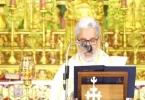In a significant decision, the Supreme Court on Wednesday held that states are competent to tax lottery schemes operating within their territories as it amounts to an activity under “betting and gambling” which is a subject of taxation covered under State List.
The judgment came on separate appeals filed by the states of Karnataka and Kerala which enacted separate laws for taxing lotteries operated by other states as well as private entities.
The two states had lost before their respective high courts and had appealed to the top court to determine whether it had legislative competence to frame a law for taxing lotteries.
A bench of justices MR Shah and BV Nagarathna said, “In our view, the legislatures of the states of Karnataka and Kerala were fully competent to enact the impugned Acts and levy taxes on the activity of ‘betting and gambling’ being organized and conducted in the said respective States, including lotteries conducted by the government of India or the government of any state.”
The validity of the two laws in question were the Karnataka Tax on Lotteries Act, 2004 and the Kerala Tax on Paper Lotteries, Act, 2005. The Karnataka HC by separate orders passed in December 2010 and March 2011 held that the Karnataka legislature had no legislative competence to pass the said law and directed refund of the amounts deposited by the states which organized the lottery schemes. These states included Nagaland, Arunachal Pradesh, Meghalaya and Sikkim.
Similarly, the Kerala high court by separate orders passed in April 2020 and August 2021 held the 2005 Act, 2005 to be unconstitutional and invalid.
Justice Nagarathna, writing the 122-page judgment for the bench said, “The tax imposed is on the ‘gambling’ nature of lotteries, which field is covered in its entirety under Entry 62 of List II (State List) and the power to impose tax under this Entry extends in relation to lottery of every kind, with no distinction as to the entity organizing the same.”
The bench held that when any state government permits the Government of India or any other state government to organize the lottery scheme in that State, Entry 62 of List II would enable the legislature of that particular state to levy taxes on the same. “Thus, ‘betting and gambling’ is a state subject except to the extent of it being denuded of its powers insofar as Entry 40 of List I is concerned (which relates to regulation of lottery schemes where Parliament will have competence).”
The states which had opposed the action of Kerala and Karnataka to levy tax on their lottery schemes had contended that the legislations in question went against the principles of “federalism and inter-governmental immunity”.
The bench explained, “What is being taxed is a gambling activity which is squarely covered under Entry 34 of List II and not on lottery per se conducted by Government of India or Government of a State…Therefore, the state legislature has the competence to tax lottery scheme which is gambling being conducted not only by the Government of India or the government of any state or by any other agency or instrumentality of a particular state but also by a private entity within the state.”
Moreover, the Court noticed that there is no specific Entry for levy of tax on betting and gambling in List I (Union List) as it is specifically provided only in State List. “Thus, Entry 62 of List II gives legislative competence to a state legislature to levy a tax on betting and gambling.” At the same time, the bench clarified that Entry 40 of List I is meant only for regulation of lotteries and this cannot be expanded to cover the power to levy taxes on lotteries by the Parliament.







